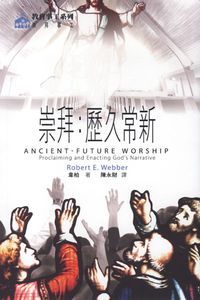- Bible
- Read the Bible
- Bible Versions
- Verse of the Day
- Reading Plans
- Verses by Topic
- Books of the Bible
- Bible Images
- Study
- Commentaries
- Concordances
- Dictionaries
- Encyclopedias
- Sermons
- Bible Atlas & Maps
- BP Wiki
- Devotionals
- Today's Devotionals
- Light of the World
- All Devotionals
- Inspirational Quotes
- More
- Picture Quotes
- Videos
- Inspirational
- Bible Study
- What The Bible Says
- Bible Q&As
- Daily Bread
- Bible by Genre
- Bible Stories
- Random Bible Verse
- Community
- Store
崇拜:歷久常新
by Robert E. Webber
上帝有一個故事,崇拜實行上帝的故事。今天的崇拜有一個危機。這問題已不單是風格的問題,而是關乎內容和形式的危機。今天教會的崇拜往往死氣沉沉和枯燥,或者忙碌和自我專注。韋柏將這些歸咎於失去上帝的異象和上帝在過去、現在及將來的歷史中的敘事。韋柏在檢視舊約的以色列和初期教會的崇拜實踐時,揭示了可以給我們今天的崇拜活力,並帶領我們走向未來的古老原則和實踐。韋柏的遺著《崇拜;歷久常新》是其一生研究和思想基督教崇拜的頂峰之作。作者情辭迫切地號召我們透過上演和宣告上帝榮耀的故事,恢復有活力、榮耀上帝、帶來轉化的崇拜。韋柏提出,通向未來的路,必然貫穿過去與歷史。
BUY NOW
Paperback, 179 pages
Published May 2009 by 基道 (first published April 2008)
© 2026 Bibleportal.com All rights reserved.

Robert E. Webber (1933 - 2007)
was an American theologian known for his work on worship and the early church. He played a key role in the Convergence Movement, a move among evangelical and charismatic churches in the United States to blend charismatic worship with liturgies from the Book of Common Prayer and other liturgical sources. Webber began teaching theology at Wheaton College in 1968. Existentialism was the primary focus of Webber's research and lectures during his first years at Wheaton. However, he soon shifted his focus to the early church. In 1978 he wrote Common Roots, a book that examined the impact of 2nd-century Christianity on the modern church.In 1985 Webber wrote Evangelicals on the Canterbury Trail: Why Evangelicals Are Attracted to the Liturgical Church, in which he described the reasons behind his own gradual shift away from his fundamentalist/evangelical background toward the Anglican tradition. Webber faced an enormous amount of criticism from evangelicals in response to this book. Nevertheless, his work was highly influential, and his ideas grew in popularity in evangelical circles. During the latter half of his life, Webber took a special interest in Christian worship practices. He wrote more than 40 books on the topic of worship, focusing on how the worship practices of the ancient church have value for the church in the 21st century postmodern era. Among his books are Ancient-Future Worship, Ancient-Future Faith, Ancient-Future Time, Ancient-Future Evangelism, The Younger Evangelicals, and The Divine Embrace.
... Show more